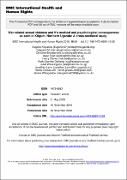War related sexual violence and it's medical and psychological consequences as seen in Kitgum, Northern Uganda: A cross-sectional study
Date
2009Author
Eugene, Kinyanda
Musisi, Seggane
Biryabarema, Christine
Ezati, Isaac
Oboke, Henry
Ojiambo-Ochieng, Ruth
Were-Oguttu, Juliet
Levin, Jonathan
Grosskurth, Heiner
Walugembe, James
Metadata
Show full item recordAbstract
Background: Despite the recent adoption of the UN resolution 1820 (2008) which calls
for the cessation of war related sexual violence against civilians in conflict zones, Africa
continues to see some of the worst cases of war related sexual violence including the
mass sexual abuse of entire rural communities particularly in the Great Lakes region. In
addition to calling for a complete halt to this abuse, there is a need for the systematic
study of the reproductive, surgical and psychological effects of war related sexual
violence in the African socio-cultural setting.
This paper examines the specific long term health consequences of war related sexual
violence among rural women living in two internally displaced person's camps in Kitgum
district in war affected Northern Uganda who accessed the services of an Isis-Women's
International Cross Cultural Exchange (Isis-WICCE) medical intervention.
Methods: The study employed a purposive cross-sectional study design where 813
respondents were subjected to a structured interview as part of a screening procedure for
an emergency medical intervention to identify respondents who required psychological,
gynaecological and surgical treatment.
Results: Over a quarter (28.6%) of the women (n= 573) reported having suffered at least
one form of war related sexual violence. About three quarters of the respondents had 'at
least one gynaecological complaint' (72.4%) and 'at least one surgical complaint' (75.6%),
while 69.4% had significant psychological distress scores (scores greater than or equal to
6 on the WHO SRQ-20). The factors that were significantly associated with war related
sexual violence were the age group of less than or equal to 44 years, being Catholic,
having suffered other war related physical trauma, and having 'at least one
gynaecological complaint'. The specific gynaecological complaints significantly
associated with war related sexual violence were infertility, chronic lower abdominal
pain, abnormal vaginal bleeding, and sexual dysfunction. In a multivariable analysis the
age group of less than or equal to 44 years, being Catholic and having 'at least one
gynaecological complaint' remained significantly associated with war related sexual
violence.
Conclusion: The results from this study demonstrate that war related sexual violence is
independently associated with the later development of specific gynaecological
complaints.
Collections
- Research Articles [54]

